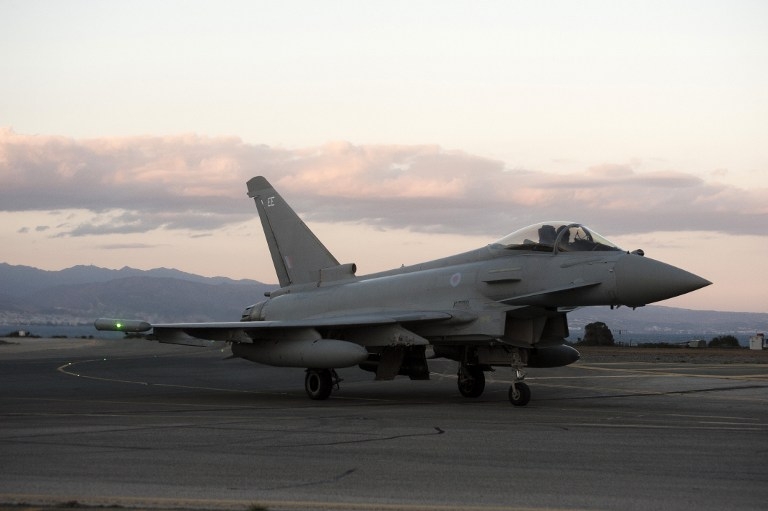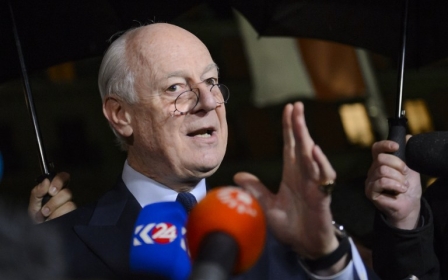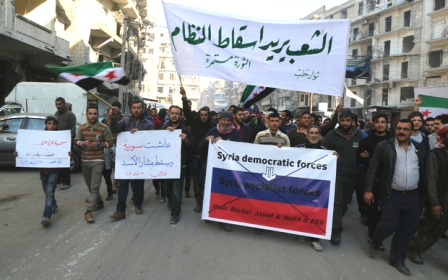Past shows UK 'not best placed' to decide Middle East borders: Minister

The British government on Tuesday appeared to reject any partition of Syria as a solution to the country’s war, suggesting that history showed that the UK was “not best placed” to make assessments about borders in the Middle East.
Asked in parliament whether UK officials had discussed a possible partition of the country with US counterparts, Tobias Ellwood, a junior foreign office minister, said it would be “wrong” for the UK to seek to influence the future shape of Syria.
“It is for the people of Syria to determine their future as to how the country needs to be managed, how it should be governed. We are at very, very early stages,” said Ellwood.
“I think it would be wrong and I think history shows Britain hasn’t always been the best placed to make assessments, not least in this particular patch of the world.”
Ellwood appeared to be referencing the UK’s role in setting many of the region’s present borders, including those of Syria, as part of the 1916 Sykes-Picot agreement with France which carved up the former territories of the Ottoman Empire between the two European colonial powers.
The UK’s statement of support in 1917 for the establishment of a Jewish homeland in Palestine, which became a British mandate after the First World War, also fuelled conflict between Jews and Arabs and led to its eventual partition into the Palestinian territories and the state of Israel.
Ellwood’s remarks came with United Nations-brokered Syrian peace talks set to resume on 9 March following the negotiation of a partial and temporary ceasefire in the five-year conflict between the Syrian government and its allies and the main opposition group.
US Secretary of State John Kerry last week appeared to indicate that Syria could be partitioned as part of any eventual peace settlement.
“It may be too late to keep it as a whole Syria if we wait much longer,” Kerry told the US Senate foreign relations committee.
Despite international efforts to broker peace talks, the US and Russia remain at odds over the future of Bashar al-Assad, with Washington and its allies insisting that the Syrian president must step down as part of any transition deal, while Moscow has waged a military campaign aimed at bolstering his position.
“Assad himself is going to have to make some real decisions about the formation of a transitional government process that is real … there are certainly plan B options being considered,” Kerry said.
But Ellwood said there could be no plan B and international powers had a responsibility to ensure the current ceasefire and the next round of talks led to a lasting settlement.
“I think it is best to avoid discussion of plan B. It has been going on too long. We have to make this work,” he said.
MPs raised concerns in the debate about the roles played by Russia and Turkey in fuelling the conflict in Syria.
John Woodcock of the opposition Labour Party questioned whether Russia could play a positive role in ending the conflict in Syria given its “aggression and flagrant violations of international law”.
Ellwood said UK estimates were that Russian air strikes and Russia-supported government air strikes had killed at least 1,300 civilians and injured 5,800 others.
Phillip Hollobone, a Conservative MP, called on the government to criticise Turkey for recent bombing of Syrian Kurdish forces.
“Again and again our NATO ally Turkey uses any excuse including the present ceasefire to attack them and degrade [Kurdish forces]," he said.
"When is the government going to take this issue seriously and call in the Turkish ambassador to say that this behaviour is not acceptable on any level?”
Ellwood said that the situation between Turkey and the Kurds highlighted the “complexity of the challenge in Syria with so many moving parts and so many organisations and entities pursuing quite separate agendas”.
“We do encourage Turkey to recognise the cessation of hostilities and to honour that,” he said.
New MEE newsletter: Jerusalem Dispatch
Sign up to get the latest insights and analysis on Israel-Palestine, alongside Turkey Unpacked and other MEE newsletters
Middle East Eye delivers independent and unrivalled coverage and analysis of the Middle East, North Africa and beyond. To learn more about republishing this content and the associated fees, please fill out this form. More about MEE can be found here.




